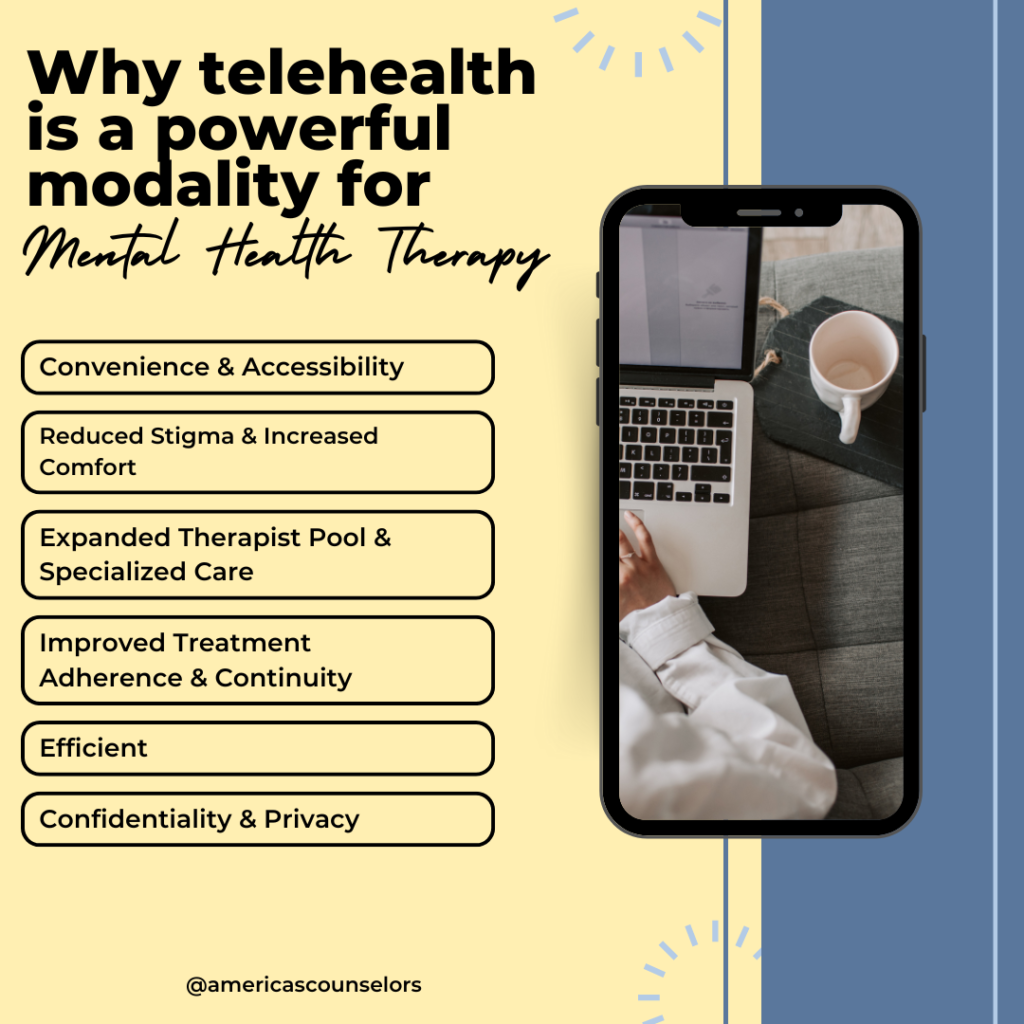
For many, seeking mental health therapy can feel daunting. Scheduling appointments, navigating traffic and even the physical act of entering a therapist’s office can be significant hurdles. Telehealth, the use of telecommunication technology to deliver healthcare services remotely, is changing the game, making therapy more accessible and convenient than ever before.
This blog post delves into the many reasons why telehealth is a powerful modality for mental health therapy, addressing concerns and highlighting the numerous benefits it offers for both therapists and clients.
Convenience and Accessibility
One of the most significant advantages of telehealth is its sheer convenience. Eliminating the need for travel translates to significant time savings, especially for individuals with busy schedules or those residing in remote areas with limited access to mental health professionals. Telehealth sessions can be conducted from the comfort and privacy of your home, removing the pressure of commuting and potentially reducing anxiety associated with in-person visits.
This increased accessibility is particularly beneficial for individuals who may face mobility issues, transportation limitations, or childcare responsibilities. Telehealth allows therapy to fit seamlessly into their lives, promoting consistency and adherence to treatment plans.
Reduced Stigma and Increased Comfort
For some, the stigma surrounding mental health can be a strong deterrent from seeking therapy. Telehealth offers a sense of anonymity and privacy that can be liberating for individuals hesitant to disclose mental health concerns in a traditional setting. This can be particularly true for teenagers or young adults who may feel more comfortable expressing themselves in a familiar environment.
The virtual space can also create a more relaxed and comfortable atmosphere for some clients. They may feel less intimidated and more open to discussing sensitive topics from the comfort of their own homes. This sense of ease can foster a stronger therapeutic alliance, a crucial element for successful therapy.
Expanded Therapist Pool and Specialized Care
Telehealth broadens the pool of potential therapists available to clients. Geographical limitations are no longer a factor, allowing individuals to connect with specialists who may not be readily available in their local area. This is particularly advantageous for those seeking therapists with specific expertise in niche areas of mental health.
Additionally, telehealth platforms often connect clients with therapists who identify with their cultural backgrounds or treatment preferences. This diversity can be instrumental in fostering trust and rapport, leading to a more effective therapeutic experience.
Improved Treatment Adherence and Continuity
Telehealth can significantly improve treatment adherence and continuity. The ease of scheduling appointments and the convenience of accessing therapy from home can lead to clients being more likely to attend sessions and stay on track with their treatment plans.
Furthermore, telehealth allows for easier communication between therapists and clients outside of scheduled sessions. Secure messaging platforms offered by telehealth platforms can be used for quick check-ins and providing additional resources. This ongoing support can contribute significantly to a client’s progress.
Addressing Concerns and Ensuring Quality Care
While telehealth offers numerous advantages, some concerns regarding its effectiveness have been raised.
Efficacy: Studies have consistently found that telehealth therapy is just as effective as traditional in-person therapy for a wide range of mental health conditions, including anxiety, depression, and PTSD.
Technology Barriers: Concerns regarding access to technology and technological literacy are valid. However, with the increasing ubiquity of smartphones and computers, these barriers are steadily decreasing. Additionally, many telehealth platforms are user-friendly and require minimal technical expertise. Therapists can also offer guidance and support to ensure a smooth transition to virtual therapy.
Confidentiality and Privacy: Confidentiality is paramount in therapy. Telehealth platforms adhere to strict HIPAA regulations to ensure all communication and client information remains protected.
Overall, the benefits of telehealth far outweigh the concerns. With careful planning and the right platform, therapists can deliver high-quality, effective mental health care virtually.
The Future of Mental Health: Embracing Telehealth
Telehealth is not a replacement for traditional in-person therapy, but rather a valuable complementary tool. It offers a flexible, accessible, and convenient modality that can significantly improve access to mental health care for a wider population. As technology continues to advance, and societal attitudes towards mental health evolve, telehealth is poised to play an increasingly crucial role in ensuring everyone has the opportunity to thrive and live a mentally healthy life.
Give Counseling Associates of America a call at 239-289-9796 if you have any questions. Most insurance companies will cover telehealth counseling. By embracing telehealth, we can break down barriers, reduce stigma, and empower individuals to take charge of their mental health and well-being.